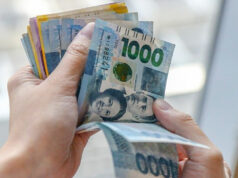Gov’t lifts ban on leisure travel, with conditions
THE PHILIPPINES has lifted the ban on nonessential overseas travel as part of a plan to reboot the economy by relaxing lockdowns meant to contain a coronavirus pandemic, according to the presidential palace.
“All outbound travel restrictions for Filipinos have been lifted,” Presidential Spokesman Harry L. Roque said at an online news briefing on Tuesday.
Filipinos with a tourist visa may now travel abroad as long as they adhere to certain requirements, including adequate travel health insurance, he said. Travelers must also sign a declaration acknowledging the risks.
There should also be no ban on Filipino tourists in the destination country, Mr. Roque said.
Returning Filipinos must undergo a 14-day quarantine and coronavirus swab test, he added.
The travel ban was lifted as the Department of Health (BoP) reported 1,540 new coronavirus infections on Tuesday, bringing the total to 47,873.
The death toll rose to 1,309 after six more patients died, while recoveries rose by 201 to 12,386, it said in a bulletin.
Health Undersecretary Maria Rosario S. Vergeire traced the surge to increased testing, community transmissions and lax enforcement of minimum health standards.
The increase has been gradual and the healthcare system can cope, she told an online news briefing. It now takes 7.9 days for cases to double she added.
“This means that it takes more than a week for the number of cases to double and we have enough resources to address the current needs,” Ms. Vergeire said.
Hospitals have assumed that the virus could be airborne, with health workers in N95 masks using aerosol-generating procedures, she said.
More than 200 experts in 32 countries had told the World Health Organization that the virus could be airborne.
SALONS
Meanwhile, Mr. Roque said the Trade department has issued a memo allowing hair salons and barbershops to increase operations in areas under a general and modified community quarantine.
Under the rules, barbershops and salons in areas under general lockdown may now offer haircuts and hair treatment services. They still must operate at 30% capacity, but can expand to 50% starting July 16.
They may offer more personal care services such as nail care, basic facial and makeup, eyebrow threading, eyelash extension, facial massage, waxing, threading, shaving, foot and hand spa in areas under a modified general lockdown.
Salons and barbershops in these areas may operate at 50% capacity and may expand to 75% starting July 16.
Strict hygiene and health protocols must be followed by both customers and employees. Customers are barred from bringing companions unless needed.
President Rodrigo R. Duterte locked down the entire island of Luzon in mid-March, suspending work, classes and public transportation to contain a coronavirus pandemic. People should stay home except to buy food and other basic goods, he said.
Mr. Duterte extended the strict lockdown twice for the island and thrice for Manila, the capital and nearby cities.
The lockdown in most areas have been eased, but mass gatherings remained banned.
Meanwhile, about 800,000 people have been tested for the coronavirus, almost four months since lockdowns of varying degrees were imposed to prevent the virus from spreading, Ms. Vergeire told the ABS-CBN News Channel.
The Philippines has 75 licensed laboratories that can run an average of 17,500 tests daily, she said. Tests peaked at 19,000 last week, she added.
The government aims to screen a million people or about 1% of its population by the end of the month.
The Health department on Tuesday confirmed a record jump in fresh cases or those whose results were released in the past 3 days.
An expert from the University of the Philippines earlier said cases may hit 100,000 by the end of August.
Infections have increased by at least 1,000 daily and unaffected areas before the lockdown have become hotspots, said UP mathematics professor Guido David.
The government should tighten border controls, increase virus screening and isolate people who have tested positive instead of allowing them to go on home quarantine, he said.
The government should also study public transportation rules after a coronavirus outbreak at the Metro Rail Transit System Line 3 (MRT-3), he said.
The rail was shut down for five days starting on Tuesday amid a coronavirus outbreak among staff members, the Transportation department said on Monday.
The rail system will be closed from July 7 to July 11, and will resume limited operations when enough workers test negative for the COVID-19 virus, it said.
The shutdown period may be shortened or extended depending on the pace and results of the tests.
Six station workers — four ticket sellers, a nurse and a train driver — have bee infected with the virus as of July 5, the Transportation department said. It added that 166 depot workers have tested positive for the virus. — Gillian M. Cortez and Vann Marlo M. Villegas



